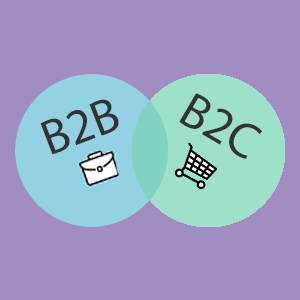 In the dynamic landscape of marketing, the lines between business-to-business (B2B) and business-to-consumer (B2C) strategies are becoming increasingly blurred. Traditionally, B2B and B2C marketing operated in separate spheres, each with its unique set of challenges and approaches. However, as the digital age unfolds, there is a growing recognition of the intersection between these two realms. In this article, we delve into the common ground where B2B and B2C marketing converge, exploring what B2B marketers can learn from their B2C counterparts and the strategies they should consider adopting.
In the dynamic landscape of marketing, the lines between business-to-business (B2B) and business-to-consumer (B2C) strategies are becoming increasingly blurred. Traditionally, B2B and B2C marketing operated in separate spheres, each with its unique set of challenges and approaches. However, as the digital age unfolds, there is a growing recognition of the intersection between these two realms. In this article, we delve into the common ground where B2B and B2C marketing converge, exploring what B2B marketers can learn from their B2C counterparts and the strategies they should consider adopting.
Understanding the Convergence
- Customer-Centric Approach: B2C marketers have long championed a customer-centric approach, focusing on building emotional connections and delivering personalized experiences. B2B marketers can borrow this principle by recognizing that, at the end of the day, they are still engaging with individuals within a business. Understanding the needs, pain points, and aspirations of these individuals can pave the way for more effective B2B marketing.
- Content is King: Content marketing has proven to be a cornerstone in B2C success stories. B2B marketers can learn from this by shifting away from purely technical or feature-based content and incorporating storytelling techniques. A compelling narrative that resonates with the audience can enhance engagement and foster a deeper connection.
- Social Media Engagement: B2C brands have mastered the art of social media engagement to reach and connect with their audiences. B2B marketers can leverage social media platforms to humanize their brand, showcase company culture, and engage in meaningful conversations. LinkedIn, for instance, is not just a platform for recruitment but also a space for thought leadership and industry discussions.
- E-Commerce Elements: While B2B transactions are often more complex, incorporating e-commerce elements into the buying process can streamline transactions and enhance customer satisfaction. B2B marketers can learn from the seamless and user-friendly interfaces of B2C e-commerce platforms to simplify the purchasing journey for their clients.
- Influencer Marketing: B2C marketers have embraced influencer marketing as a powerful tool to amplify their brand messages. B2B marketers can identify and collaborate with industry influencers to build credibility and reach a wider audience. These influencers can serve as advocates, providing valuable endorsements that resonate with potential B2B clients.
Strategies for B2B Marketers
- Embrace Personalization: Utilize data-driven insights to tailor marketing messages and experiences to the specific needs of individual businesses. Personalization goes beyond addressing a company; it’s about understanding and catering to the unique challenges and goals of the individuals within that organization.
- Invest in Visual Storytelling: Enhance the visual appeal of B2B content by incorporating storytelling elements. Infographics, videos, and visually engaging presentations can make complex information more digestible and memorable, contributing to a more compelling brand narrative.
- Build a Strong Online Presence: Establish a robust online presence through social media, a user-friendly website, and consistent content creation. B2B buyers often conduct extensive online research before making purchasing decisions, so a strong digital footprint is crucial for building trust and credibility.
- Foster Community Engagement: Create a community around your brand where B2B clients and prospects can connect, share insights, and engage in discussions. This sense of community not only strengthens relationships but also positions your brand as a thought leader within the industry.
Conclusion
As the worlds of B2B and B2C marketing continue to converge, B2B marketers have a valuable opportunity to learn from the strategies that have propelled B2C success. By embracing a customer-centric approach, leveraging compelling content, and incorporating elements of e-commerce and influencer marketing, B2B marketers can navigate the intersection of these two realms and unlock new avenues for growth and engagement. The future of marketing lies in the ability to adapt and integrate the best practices from both B2B and B2C worlds, creating a holistic and effective approach that resonates with today’s diverse and discerning audiences.
